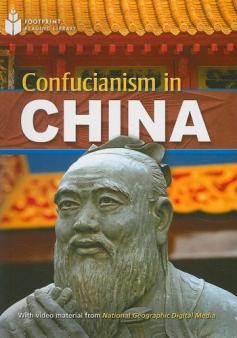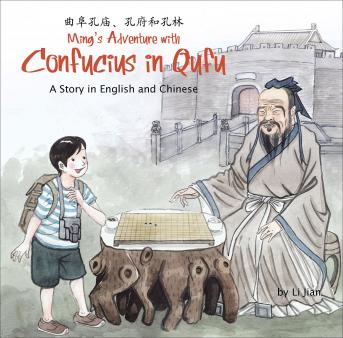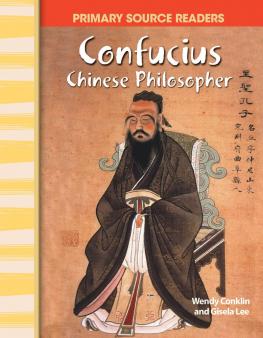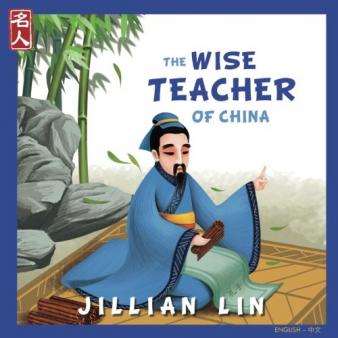Finding Chinese Confusing ?
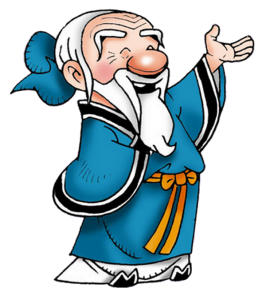
Confucius
Sometimes learning about new cultures and different countries can be confusing. This is especially the case when there is a new language and that language uses characters instead of letters. That is why we have created a cartoon Confucius and two fun characters to help you learn.
Confucius was actually a real character and lived long ago. He was a very wise man and many of his wise sayings have been written down and still help people today. This is called:
Confucianism
Confucius is a very famous man in Chinese history. He lived in China a long time ago and became very well known as a great philosopher or thinker.
Confucianism is the name given to the set of beliefs taught by Confucius. He taught people how they should behave towards each other which is why Confucianism is considered a way of life for many rather than a religion.
Top 10 facts
1. Confucius was a Chinese philosopher. His real name was K'ung Fu-tzu; Confucius is the Westernized version.
2. Confucius believed that society could become perfect if the people who lived in it worked very hard to behave properly towards each other.
3. Confucius gave up his job in the government so he could concentrate on teaching people how to live in peace.
4. Confucius's teachings were meant to be advice for the rulers of China.
5. Confucius said people should practise five virtues: kindness, goodness, honesty, modesty, wisdom and trustworthiness.
6. Today about six million people in China and South East Asia practise Confucianism.
7. Confucius believed that family was more important than each individual person.
8. After Confucius died, people built temples in his memory.
9. Rituals are very important in Confucianism.
10. Confucius became famous for his wise sayings and writings.
Did you know?
As well as being a teacher, Confucius also worked as a shepherd, a cowherd, a clerk and a book-keeper.
Even as a young child, Confucius loved to learn and at the age of 22, he set up a school for young people. No one was ever turned away from his school and his pupils paid what they could to attend.
Confucius taught people how to behave in their private life as well as the rules of good government based on love, justice, respect, wisdom and sincerity.
Confucius strongly believed that a ruler could not bring prosperity to his people by making laws alone, he had to set a good example too.
For many people, Confucianism is a way of life rather than a religion.
Family values are a very important part of Confucianism. Children are taught to respect their parents and to do as they are told.
There are five texts which contain Confucian scriptures. These include poems, history, rituals, and sayings.
After Confucius died, shrines were built in his honour and Confucianism became the state religion of China.
Every year the Confucian ceremony is celebrated all over China. It is always held on 28 September, Confucius’s birthday.
Confucius is famous for many of his sayings but is especially well remembered for his Golden Rule, "What you do not wish for yourself, do not do to others.” Something we should all remember!
About
Confucianism is the system of beliefs taught by Confucius. Confucius was born in the state of Lu in northeast China in the 6th century BC.
Confucianism has no church organisation, priests or holy beliefs.
Confucius taught people how they should behave towards each other which is why Confucianism is considered a way of life for many rather than a religion. Confucius believed people should try to be good citizens; he is not worshipped as a god but as a great teacher.
Confucius believed that society could become perfect if the people who lived in it worked very hard to show "beautiful conduct”. Confucius placed a strong importance on li, which means proper or orderly conduct – in other words behaving properly! This was the message Confucius wanted to deliver through his teaching.
Confucius wanted people to behave well so he taught five basic ideas for people to follow:
- Always be considerate to others.
- Respect your ancestors.
- Aim for harmony and balance in all things.
- Avoid extremes in behaviour and emotion.
- Live in peace and harmony and keep in touch with the spiritual forces of the universe, including nature.
Confucius also taught the principle of jen (Confucius himself translated it as ‘love mankind’). Jenstresses the importance of showing courtesy and loyalty to other people and rejects violence.
Chinese people believe that the music of bells calms the mind; it was apparently on hearing some bell music that Confucius decided to give up his home comforts and live on rice and water for three months.
Confucius placed a great deal of importance on family and respecting your elders, which is why there is such respect shown for parents in traditional Chinese culture.
By 124BC a university had been set up to teach Confucianism. Although Confucius left very few writings, his followers gathered his now famous sayings into a number of books (The Analects of Confucius, The Book of Mencius, The Great Learning and The Doctrine of the Mean).
Over time aspects of Buddhism and Taoism (another Chinese religious belief system) have influenced Confucianism. Many people in China practise a combination of these three religions.
Confucius left his mark on Chinese culture and on the world. Many of his sayings are still quoted today and each year on his birthday, September 28, the Confucian ceremony is celebrated all over China.
Rituals are very important in Confucianism, especially the worship of ancestors, as Confucius believed that the past plays a big part in shaping the future.
Children's books about Confucianism
Glossary of Confucian terms
Analects - the collection of Confucius' sayings.
Confucius - a Chinese philosopher, teacher and scholar.
Chun Tzu - the Confucian ideal of a perfect human being.
Jen - the most important Confucian virtue which is all about showing love and respect for others.
Kung Fu-Tzu - the Chinese name for Confucius.
Li - the Confucian idea of proper behaviour.
Ti - the Chinese word for ancestor.
Tien - literally means “heaven”.
Wen - means the ‘arts of peace’, in other words culture and the arts, like music, painting, poetry, literature, and so on.
Make Chinese Count For You
We all have our favourite subjects at school, or perhaps your favourite thing about school is the bus ride home ! However we hope that you will learn to love learning new things. One new thing we can all try is a new language. Your parents probably had to learn French or Spanish when they were at school. The reason they were given was it would be useful when they were on holiday or when we were part of the European Union. However not many people ever practiced their language skills after the left school. Today with the internet and business being done on a global scale we should all look beyond those languages close to us and look at which languages could really be important in the future.
One such language is Chinese and there are over 1.2 billion native speakers, so the benefits of learning Chinese are vast. For example Mandarin is home to countries like Taiwan, Singapore, and of course China. It's a language that has deep roots with over 3,000 years of history to back it up.
That's why the culture of China has largely shaped countries like Korea and Japan, including their educational institutions and languages.

Korea for example was initially formed using Chinese characters, and eventually replaced it with Hangul to form their own language. The same goes for Japanese and Vietnamese.
Why learn Chinese?
Some believe that learning Chinese is one of the best investments you can make.
China is one of the fastest growing economies in the last 2 decades. It's shaping entertainment, business, and even politics around the world. While there are many English speakers living in China and other Mandarin speaking countries, you'll find more people that do not. Besides, even if one speaks a language, there's no sweeter sound than hearing your native tongue.
So today, we're going to share with you the top 10 major benefits of learning Chinese. Some you may already be aware of, and some may even surprise you.
10 Major Benefits of Learning Chinese
Let's begin!
1. Communicate with over 1 Billion people instantly
As we mentioned, Chinese is the most widely spoken language in the world. Anywhere you travel or live on Earth, you're bound to spot a fellow Chinese speaker around you. Learning Mandarin will instantly open up communication abilities to over 1.2 Billion people and growing quickly.
2. Open up new job opportunities everywhere
The ability to communicate to over one billion people has major value in the job marketplace. Of course, this includes companies in China and other Mandarin speaking countries that you can apply to.
Companies all around the world are striving to tap into the Chinese marketplace, and you'll immediately differentiate yourself if you can speak Mandarin.
3. Appreciate Chinese food like you've never had before
Love dimsum, wontons, fried rice? So do we.
When it comes to evaluating the quality of Chinese restaurants, the number one signal is to observe how much English is on the menu. The less, the more authentic.
With that said, if you truly want to order with confidence at a Chinese restaurant, you'd need to learn the basic of Chinese.
4. Gain a competitive advantage in the business world
Beyond just gaining a leg up in your career, learning Chinese is just smart for business. Whether you're a business owner yourself or looking to get into business, the future of business will be in China. Whether you like it or not, China is the first place any great business will look to if they want to go international.
This is your opportunity to jump ahead of the curve.
5. Build stronger relationships with your Chinese friends
From school friends to neighbours, many of us have a native Chinese speaker in our life.
While English is widely taught and spoken amongst Chinese speakers, few can actually speak it with confidence. It's going to be many decades before the majority of Chinese speakers can speak your language, and that's being conservative.
Beyond the relationships you can form in real life, there's even a greater need in the online space. Unlike other countries, the Chinese government places strict regulations on letting consumers use non-Chinese applications.
Examples include using Tudou instead of YouTube, QQ instead of WhatsApp, and that social networks like Facebook are not available for use.
6. Enjoy Chinese movies, TV shows, and music authentically
With production companies like Alibaba Pictures, Tencent Pictures, and more coming into the global scene, Chinese entertainment is accelerating at a rapid pace. This is growing faster with the advent of distribution channels like Netflix and Prime Video.
While subtitles exist translations may not always make sense directly. If you want to authentically enjoy these entertainment forms at its highest quality, your best bet is to learn the language.
7. Travel with confidence anywhere (not just China)
Planning to travel to Asia some time in the near future? That's right, learning Chinese is what will help you get around easily. Even if you don't plan to travel to a country where Mandarin is an official language, people from China are always visiting and migrating there.
You'll also find that signs, menus, and other communication is provided with Chinese translations everywhere you go in Asia to accommodate the millions of Chinese travelers.
8. Improve your brain function
Given how different Chinese characters, accents, and history is from English, you'll have to think outside the box. It's a language that's completely different than what you're used to as an English speaker, which is why it's a great exercise for your brain.It'll challenge your mind like never before, and you'll find yourself stimulated by the new knowledge you're accumulating as you learn this unique language.
9. Learning Chinese is not as hard as you think
But don't let that intimdate you. Despite the difference in Chinese characters, most people overestimate how difficult it is to learn.Yes, there are challenges to learning Chinese. The biggest is probably because while English uses phonetic writing, Chinese is composed of pictograms and semi-phonetic ideograms.
The good news is, this is the hardest thing about Chinese. There are also things you don't have to learn, like tenses, cases, genders, or other simple grammars which are required for most other languages.
Given how much time a new language learner normally spends on learning genders, tenses, and other grammar rules, you'll bypass all of that when you decide to learn Chinese.
10. There are more Chinese learning resources than ever
Perhaps more importantly is the resources available to you. With Chinese being the most spoken language in the world, it also comes with learning options that are powerful.
Then there is free apps like Duolingo, YouTube videos, and podcasts that you can immerse yourself in between your lessons. It's never been easier to learn a new language like Chinese.
Are there any major benefits of learning Chinese you can think of?
These were just a short list of benefits that we wanted to highlight for you. We know this is just the tip of the iceberg when it comes to learning any new language.Now, we'd like to hear from you.
Hands Up Who Wants to Try
Be the first to explore our exciting new Virtual Space. It will be a school trip with a difference where you can have all the fun of exploring new places and learning new things without having to leave the class room.

Many of you love to play video games and explore the virtual worlds that have been created. Now we have a space that can be fun and where you can learn. It is only in its early stages and we hope it will be used by everyone so we have had to make it adult friendly.... and you know that they don't get onto technology as well as you!
As you find your way around the gallery and other spaces there will be different exhibitions, videos and downloadable material which you will need to complete the learning tasks in your journals. So have fun and always stay safe online.


